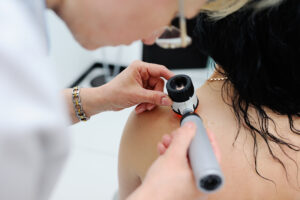Healing After Mohs Micrographic Surgery: How Skin Substitutes Can Help
- Posted on: Sep 10 2025
If you’ve had Mohs micrographic surgery (MMS) to remove skin cancer, you may wonder
how your wound will heal. In many cases, stitching or natural healing is enough. But for some
larger or more delicate wounds, your Mohs surgeon may recommend using a skin
substitute—a modern option that can help your skin recover more smoothly.
What Are Skin Substitutes?
Skin substitutes are advanced materials that act like a protective “cover” for your wound while
new, healthy skin grows. There are different types:
- Biologic substitutes come from human or animal tissue.
- Synthetic substitutes are made from man-made materials.
- Biosynthetic substitutes combine the two.
All are designed to mimic natural skin and encourage healing.
Why Use Them After Mohs Micrographic Surgery?
Skin substitutes are not new—they have been used for chronic wounds such as diabetic ulcers
and burns. In Mohs surgery, they’re especially helpful when:
1. The wound is large or complex.
2. Bone, cartilage, or other important structures are exposed.
3. A skin graft is not the best choice or it is not possible.
4. Healing might otherwise take too long, raising the risk of infection or scarring.
Your Mohs micrographic surgeon’s goal is to close the wound in a way that protects you,
promotes healing, and achieves the best cosmetic result.
Benefits of Skin Substitutes
- Create a natural barrier against infection
- Speed healing time so wounds close more quickly
- May reduce pain and scarring
- Can result in a better cosmetic outcome compared with traditional closure methods
Think of them as giving your skin a “head start” in the healing process.
Things to Keep in Mind
Like any medical treatment, skin substitutes have potential downsides:
- Rarely, the body may react to them with inflammation or infection.
- Some products require careful storage and may not always be readily available.
- Typically a series of skin substitutes needs to be applied over a course of weeks to fill a
deep wound - Costs can vary, and while many are covered by insurance, some may not be
Your Mohs surgeon will weigh these factors before recommending them.
The Bottom Line
Skin substitutes are a valuable tool that Mohs surgeons use to help patients heal from difficult
wounds. They aren’t needed for everyone—but in the right situations, they can shorten
recovery, lower risk for infections and other complications, and improve cosmetic results.
If you’d like to learn more, talk with your Mohs surgeon about whether a skin substitute may be
right for you. To find a qualified Mohs surgeon, visit the American Society for Mohs Surgery’s
Surgeon Locator or call us directly at (785) 783-2070.
Posted in: Uncategorized



